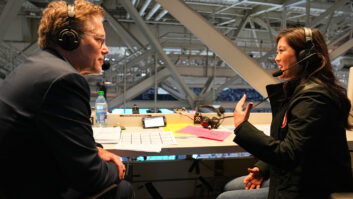Yesterday, I was �helping� a fellow broadcast engineer install a brand-new, rather sizable FM transmitter. It�s a good excuse to be both slightly useful and to get a ride up the mountain.
The crimpers, worn as they are, are worth more than any toy or tool I have owned.

All transmitter sites are magical. In days gone by, they might have had religious significance � closer to God in many ways. From the door of this windowless site, one can see the mega-city below and know that on average, 1 percent of the car radios being used in this morning�s rush hour are listening to any one of the 99 radio signals available. Actually, this girl is more popular than most, so maybe one-in-20 of those little cars are connected to the other end of this link budget. We won�t touch anything serious until drive-time is over.
It�s a time, place and occasion to meditate and just put on connectors. All the thinking has been done by my friend. I don�t have to solve anything but tactical physical construction. There is a zen in that.
I think back to my first general manager. Lou believed that a transmitter had just so much power, and each radio tuned in to the station took a bit of that power. Lou watched the power output meter, trusting that the fluctuations represented people tuning in and out. He was not entirely wrong. I still can�t look at a TPO meter without thinking about this basic connection that makes radio work, and how much power is broadcast and how little in the end reaches and how much less than that is consumed by each radio. The first law of thermodynamics has its limits. That is, not everything is measurable.
Part of this project is to clean up an inherited control rat�s nest on the now auxiliary transmitter. Barrier strips, tapping screws, applying labels, crimping spade lugs � you know the drill.
I had suspicions before, but the exact minute that I learned that I wanted to do this for the rest of my life came as I took a summer job assisting Cliff, who took care of a dozen or so transmitters.
Cliff knew a lot I didn�t, despite my four-year degree and years of playing low-cost disk jockey and all-around radio handyman. In my spare time, I had taken over as chief of a small daytime directional station that had been one of Cliff�s clients.
What was an opportunity for me was a loss of business for Cliff, as the small station owner found he could cut his engineering expense by hiring a near incompetent � me. I didn�t make that connection back then. All I knew is that the station needed a rebuild, and I had the summer off from teaching budding electricians about three-phase and power factors while venerating the NEC code book.
In the hand-off, Cliff should have been less than friendly, but broadcast engineers don�t do that. Instead, he asked me if I wouldn�t want to work with him some. In the next two weeks, I learned more than I had ever before in the overnight serenity of his transmitter sites � the value of caffeine and the safety of the chicken stick, to name a few important lessons.
One of his favorite tricks was using small 600/600, very cheap transformers to kill off ground loops and match single ended gear to balanced audio. He sent me off to a small supplier to get some of these. The small supplier (now rather grown up) had connections to a union radio station that needed a staff engineer. If I hadn�t felt bad before, I got the gig and had to tell Cliff I was going to take the opportunity to get into broadcast engineering in a bigger way.
When I first showed up at Cliff�s shop, I had a collection of K-Mart tools. Cliff handed me a really good crimper so the wires would stop falling out. When I resigned, I told Cliff the truth: I owed him, and not to worry at all about paying me for my brief time. I wasted his time, slowing him down as he explained things. I handed over the crimper, but Cliff said no � keep it; I�d need it.
I got a lot for a few tanks of gas running around the south end of the state after dark.
A few weeks later a check arrived in the mail. Broadcast engineers are like that.
It�s 40-some odd years later, a thousand miles away, and Cliff�s crimpers have been around the world and to more of these holy sites than Cliff will ever see himself. I set the crimpers down on my open spectrum analyzer, and it hits me that the crimpers, worn as they are, are worth more than any toy or tool I have owned. And no matter how I try, I will never be able to pay for them.
The Wandering Engineer is an industry stalwart who has been in broadcasting since the days of Marconi and Tesla. He gives his thoughts on the current state of broadcast engineering and the broadcast engineer.












